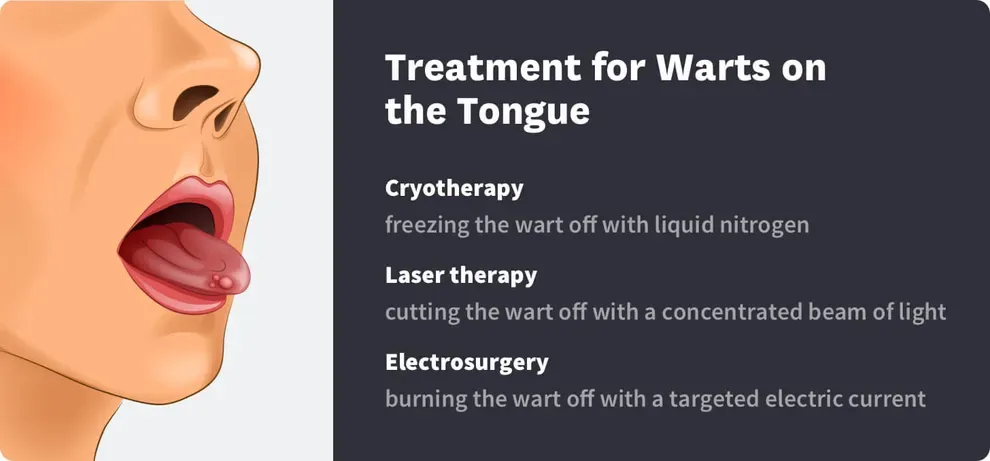Are Warts on the Tongue Dangerous?

Table of Contents
- Causes
- Are They Dangerous?
- Treatment Options
- Prevention
- References
Tongue warts are unpleasant and sometimes painful lesions caused by an infection of human papilloma virus (HPV). These small bumps may last anywhere from a few months to several years, and if other people touch them, those people can become infected with HPV as well. Transmission usually takes place through kissing and oral sex.
On their own, tongue warts are not dangerous. But the HPV virus that causes them is linked as a cause of several types of cancer. It is important to slow or stop the spread of HPV by limiting the amount of intimate contact you have with other people while you have an active case of oral warts.
What Causes Warts on the Tongue?
Like all warts, warts on the tongue are caused by an infection of human papilloma virus (or HPV). There are more than 100 different types of documented HPVs across the globe.
HPV is considered a sexually transmitted disease, meaning that it is passed from person to person through intimate physical contact. It is most likely to spread when someone who is not infected has direct contact with the warts of someone who is infected. This means both kissing and oral sex are the most likely forms of contact to lead to tongue warts.
Some small oral lesions may look similar to tongue warts but are not warts at all. These include:
Lie bumps, small white bumps on the tongue that may be mildly painful but go away on their own in a few days
Cysts
Injuries, usually from biting the tongue
Syphilis sores
Tongue warts can come in various sizes, from a small as 1mm to as large as 1cm or larger.
If you discover that you have new bumps on your tongue, cannot explain them and cannot identify them, your best cause of action is to get to your doctor or to an urgent care facility for an examination. If the physician can’t identify the bumps, he or she will run tests to gain an conclusive ID.
Are Warts on the Tongue Dangerous?
Warts on your tongue aren’t dangerous, but many people find them uncomfortable and unsightly. Some oral warts may be painful, especially when eating hard-textured foods and drinking hotter liquids like coffee, tea or soup.
If they’re large enough, warts can make it difficult to eat and speak normally.
However, some strains of the HPV virus that causes the warts have been linked to the development of certain types of cancer, including head and neck cancer, penile cancer and especially cervical cancer. If your HPV infection has caused you to develop tongue warts, you may be at a higher risk of developing oropharyngeal cancer (cancers of the mouth, throat, and esophagus).
Doctors can spot early signs of HPV-driven cancers if they know to look for them, so be sure to let your doctor know about your tongue warts even if you choose not to seek treatment for them. Your doctor will monitor your condition over time and let you know if they discover any worrying signs.
The CDC says about 10% of men and 3.6% of women have oral HPV.

Treatment Options
Tongue warts usually go away on their own over time—but possibly not as soon as you would like. Remission can take anywhere from a few months to several years.
If you want to wait and see what happens with your wart, try to chew your food on the opposite side of your mouth from where it is located. This will reduce irritation in the area, make your wart less likely to hurt, and may help your infection clear up faster.
If you want a faster solution or your warts still have not gone away after several years, you can also ask your dentist or dermatologist to help you remove your warts. This is usually done through:
Cryotherapy (freezing the wart off with liquid nitrogen)
Laser therapy (cutting the wart off with a concentrated beam of light)
Electrosurgery (burning the wart off with a targeted electric current)
Which treatment is most appropriate for you depends on the type and location of your warts. All of the options are simple, relatively painless procedures, and all enjoy high success rates.
Prevention
Because tongue warts are usually transmitted through sexual contact, you can avoid getting them by avoiding intimate contact or by taking precautions during your intimate engagements. The first option isn’t a realistic solution for most people because humans crave intimacy.
A better solution, then, is to lower your risk of contracting tongue warts by taking precautionary measures, such as:
Adults up to age 45 can be vaccinated against HPV. The vaccine is highly effective against most types of HPV, including those that can cause oral warts. While it is still possible to become infected while vaccinated, it is highly unlikely.
Oral warts are contagious, so if one of you has them, close contact will spread them to the other.
The more people you have intimate contact with, the greater the chance that one of them is infected with HPV. Fewer partners means fewer chances to become infected yourself.
HPV is spread through skin-to-skin contact, so using a condom or a dental dam during oral sex can help stem transmission. Condoms and dental dams are more effective against other STDs other than HPV, but they remain an effective aid against the spread of HPV.
Smokers have a higher chance of becoming infected with HPV.
